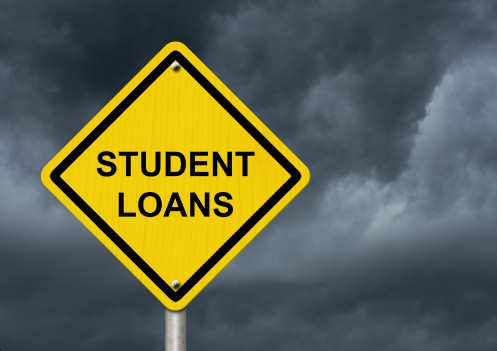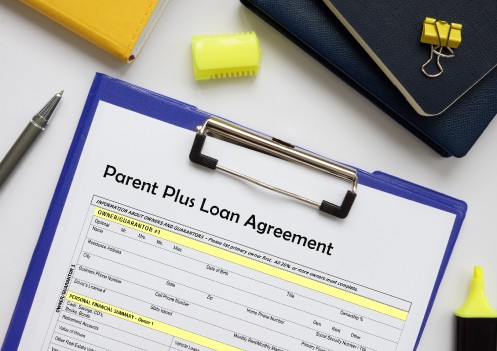Make sure you share this with anyone who has student loans. Things are changing fast, and doing nothing could have serious consequences.
The Government Has Restarted Collections
The U.S. Department of Education has started sending notices to nearly 200,000 defaulted borrowers. These notices warn that their federal benefits, like Social Security, will be garnished in just 30 days.
And that’s not all.
The Treasury Department is also preparing to notify 5.3 million borrowers this summer that their wages will be garnished.
This is a big shift from what began in March 2020, when collections were paused and relief programs were introduced.
But now the government is moving forward, and you must not sit still.
A Warning from a Trusted Expert
Mark Kantrowitz, one of the nation’s top higher education experts and a great friend, says:
“Borrowers are usually given 65 days’ notice before the garnishment of their federal benefits. The fact that the Department is only giving 30 days is a sharp deviation from past practice.”
He also warns:
“Garnishing Social Security and disability checks used to be a last resort—typically a full year after wage garnishment had already failed.”
In other words, they are skipping steps. This is more aggressive than before and could catch millions of people off guard.
If You’re in Default: What You Must Do Now
Do not ignore this. Open every email or letter from your loan servicer. Hiding from it will only make things worse.
Contact the Default Resolution Group:
Phone: 1-800-621-3115
TTY: 1-877-825-9923
Online: https://myeddebt.ed.gov
They can help you:
-
Consolidate your loans into a new Direct Consolidation Loan
-
Rehabilitate defaulted federal student loans by making 9 out of 10 consecutive, on-time, voluntary, reasonable and affordable monthly payments. This will remove the default from your credit history. You can then switch into an income-driven repayment plan, which bases the loan payment on a percentage of your discretionary income, as opposed to the amount you owe.
If you are living on Social Security, act immediately. You may be able to request retroactive forbearance to wipe out missed payments.
FAQs
1. What changed as of May 5, 2025?
The federal government resumed involuntary collections on defaulted loans, ending a five-year pause. Borrowers in default may now face wage garnishment, tax refund seizures, and Social Security offsets. While payments and interest resumed in 2023, collections were paused until now. The SAVE repayment plan has ended due to legal challenges, and borrowers are being shifted back to older income-driven repayment (IDR) plans.
2. What if I was in the SAVE plan and it disappeared?
Borrowers enrolled in SAVE are being moved to older IDR plans like PAYE, IBR, or ICR. Log into your account at StudentAid.gov to review your current repayment plan and make any needed changes.
3. Does this apply to Parent PLUS loans?
Yes. Parent PLUS loans are federal loans and are subject to collection if in default. To access income-driven repayment, they must first be consolidated into a Direct Consolidation Loan, then enrolled in the Income-Contingent Repayment (ICR) plan.
4. Can they seize my tax refund if I’m in default?
Yes. The Treasury Offset Program has resumed. If you’re in default, your federal and state tax refunds may be seized.
5. What is the first step if I’m in default?
Call the Default Resolution Group at 1-800-621-3115. Ask about:
* Loan Rehabilitation: Make 9 out of 10 consecutive on-time monthly payments to restore your loan to good standing and remove the default from your credit report.
* Loan Consolidation: Roll your defaulted loans into a new Direct Consolidation Loan and restore eligibility for repayment plans and forgiveness.
You can also begin the consolidation process at StudentAid.gov.
6. What if I’m not in default?
Stay current on payments and remain enrolled in an IDR plan that fits your situation. Update your income and contact information regularly to avoid falling behind.
Sign up for autopay to have your monthly payments automatically transferred from your bank account to the loan servicer. Not only will you be less likely to be late with a payment, but you’ll get a slight interest rate reduction (0.25% percentage points) as an incentive.
If you encounter short-term financial difficulty, such as medical or maternity/paternity leave or job loss, consider a deferment or forbearance. Interest may continue to accrue during this temporary suspension of your repayment obligation.
7. My friends say I can just ignore the loans—is that true?
No. Ignoring your loans can lead to wage garnishment, tax refund seizures, Social Security offsets, collection charges up to 25% and credit damage. Ignoring debt gives away your power—dealing with it gives you control.
8. Can I discharge my student loans in bankruptcy?
Rarely. You must file an adversary proceeding and prove “undue hardship” in court. It’s possible but difficult. Speak with a bankruptcy attorney who has student loan experience.
9. Is there forgiveness for permanent disability?
Yes. You may qualify for a Total and Permanent Disability (TPD) Discharge if the VA, SSA, or your doctor certifies you. Visit DisabilityDischarge.com or call 1-888-303-7818.
10. What if I qualify for Public Service Loan Forgiveness (PSLF)?
You must:
* Have Direct Loans
* Be on a qualifying repayment plan (e.g., PAYE, IBR, ICR)
* Work full-time for a qualifying nonprofit or government employer
Submit your PSLF Employment Certification Form annually using the PSLF Help Tool at https://studentaid.gov/pslf to track qualifying payments. PSLF is still active but closely scrutinized.
11. Do student loans go away at death?
Federal Loans: Yes. If a borrower dies, the loan is discharged—including Parent PLUS loans if the student or parentdies. A death certificate must be submitted. No tax liability is assessed.
Private Loans: It depends. Some forgive debt at death, but many do not. If there’s a co-signer, they may still be responsible. Review the loan agreement carefully.
12. What kind of student loans does all this apply to?
These rules apply to:
* Federal Direct Loans (Subsidized, Unsubsidized, Direct PLUS, Consolidation)
* Federal Family Education Loans (FFEL) – if held by the U.S. Department of Education
* Parent PLUS Loans (with limits on repayment options)
* Defaulted federal loans
These rules do not apply to:
* Private student loans
* Institutional/state-based loans
* Refinanced federal loans through private lenders
13. Do any of these rules help with private student loans?
No. Private loans are not eligible for:
* Income-driven repayment
* PSLF
* Federal forbearance or deferment
* Federal discharges for disability or death
What you can do:
* Contact your lender and ask about hardship options
* Refinance if you qualify for better terms
* Consult a lawyer if collection is aggressive
14. I have a Parent PLUS loan—what are my options?
To lower payments:
* Consolidate the loan into a Direct Consolidation Loan
* Enroll in ICR, the only IDR plan available to Parent PLUS borrowers
Note: ICR payments are often higher than those under other IDR plans.
15. What if my wages are already being garnished?
Call the Default Resolution Group at 1-800-621-3115. Ask about:
* Loan rehabilitation
* Consolidation
* Hardship hearing: You may qualify to challenge garnishment based on financial hardship or if you involuntarily lost your job less than 12 months ago.
16. What’s the difference between loan rehabilitation and consolidation?
Rehabilitation:
* Make 9 out of 10 consecutive on-time monthly payments
* Removes the default status from your credit
* Takes longer, but helps credit score
Consolidation:
* Combine loans into a new Direct Consolidation Loan
* Get out of default faster, access new repayment plans
* Does not remove the default mark from your credit history
17. Will I lose my Social Security benefits if I’m in default?
Possibly. The government can garnish up to 15% of your monthly Social Security check, leaving you with at least $750/month, if you’re in default. Act fast to avoid this.
18. Can I still apply for SAVE or another income-driven plan now?
SAVE and REPAYE have ended due to court challenges. However, you can apply for:
* PAYE
* ICR
* IBR
Check StudentAid.gov to view and switch your repayment plan.
19. How do I know if my loan is federal or private?
Log into StudentAid.gov using your FSA ID.
* If it’s listed, it’s a federal loan
* If it’s not listed, it’s likely a private loan
20. What if I’m being contacted by debt collectors?
Debt collectors for defaulted federal loans are contracted by the U.S. Department of Education. Beware of scams. To verify:
* Ask for the name of the agency
* Call the Default Resolution Group to confirm
* Do not ignore notices—respond and document everything
Key Contacts for Help
Federal Student Aid Info Center: 1-800-433-3243
Website: https://studentaid.gov
Default Resolution Group: 1-800-621-3115
TTY: 1-877-825-9923
Website: https://myeddebt.ed.gov
Loan Servicers:
MOHELA: 1-888-866-4352
Nelnet: 1-888-486-4722
Aidvantage: 1-800-722-1300
Edfinancial: 1-855-337-6884
TPD Discharge: 1-888-303-7818
Website: https://disabilitydischarge.com
Ombudsman Group: 1-877-557-2575
Website: https://studentaid.gov/feedback-ombudsman
Credit Counseling – NFCC: 1-800-388-2227
Website: https://www.nfcc.org
Bankruptcy Help: Find an attorney at https://www.nacba.org
Suze’s Bottom Line
I know many of you feel overwhelmed or even ashamed to look at your loan balance.
But hiding from your loans will not protect you. Action will.
If you’re in default and do nothing, you could soon be left with:
Smaller paychecks
Seized tax refunds
Slashed Social Security checks
But if you act now, you still have options.
You are not alone. You are not your debt. You are your courage, and you are your plan.
Let this be the moment you take your power back.
Top Resources for You

The Ultimate Retirement
Guide for 50+
Learn More

MUST HAVE® Documents
Online Program
Learn More







